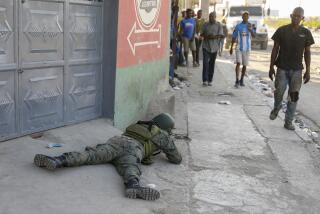Special Adviser Upbeat on Haiti Policy
- Share via
WASHINGTON — The special U.S. adviser on Haiti gave an upbeat account Friday of recent policy changes toward that country, asserting that refugee problems are nearing a solution and expressing hope that tightened sanctions will restore democracy.
William H. Gray III, appointed special adviser by President Clinton three weeks ago, rejected criticism that the policy of trying to force the surrender of the Haitian military through sanctions is doomed to fail.
Appealing for patience, Gray noted that “mandatory, total sanctions” approved by the U.N. Security Council went into effect only last weekend.
“You’ve got to make a distinction between the new sanctions and the old sanctions,” Gray said, meeting with reporters for the first time since assuming his new duties.
His comments came against a background of growing skepticism about the efficiency of sanctions in bringing down the military and growing concern about delays in implementing the newly liberalized policy on dealing with refugees.
On May 8, the same day Gray was appointed, Clinton announced that he was abandoning his policy of forced repatriation of all refugees. The new policy calls for allowing refugees to make a claim for political asylum.
Since then, the Clinton Administration has chartered vessels as potential interview sites, while U.S. officials have been searching the Caribbean in search of countries willing to allow their territory to be used for interviews.
Gray, who just returned from the Dominican Republic where he had met with President Joaquin Balaguer, was optimistic about enlisting Balaguer’s cooperation in ending the cross-border seepage of oil and other goods into Haiti.
“It was very clear that he understood that this was not a voluntary situation but that it was the entire world community, including the Western Hemisphere of nations, that were saying this must be done,” Gray said.
On Friday, the United Nations agreed to send planes, helicopters and motorboats to the Dominican Republic to help enforce the embargo, the Dominican military chief said.
Gen. Constantino Matos Villanueva also ordered more of his troops to the border to shore up enforcement of the embargo, according to a military statement issued late Thursday.
In a separate development, members of the disbanded Tontons Macoutes militia returned to Haiti’s political stage Friday, formally reorganizing to join Haiti’s army against possible foreign attack.
The rebirth of the Macoutes dramatically illustrates the rise of anti-democratic elements in Haiti since the army overthrew elected President Jean-Bertrand Aristide in 1991.
Holding up a portrait of former dictator Francois (Papa Doc) Duvalier, a Macoutes spokeswoman declared that the militia members “already occupy the four corners of the country. Now we are in readiness.”
“We are here to tell the army it is not alone,” said Bertha Desait, cheered by 100 Macoutes surrounding her in a downtown Port-au-Prince office.
More to Read
Sign up for Essential California
The most important California stories and recommendations in your inbox every morning.
You may occasionally receive promotional content from the Los Angeles Times.













